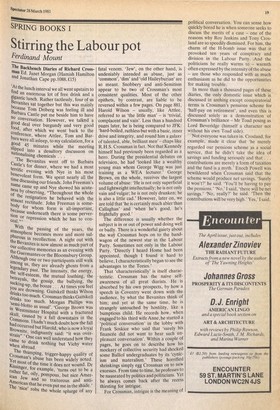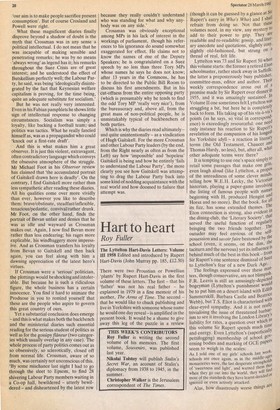SPRING BOOKS I
Stirring the Labour pot
Ferdinand Mount
The Backbench Diaries of Richard Crossman Ed. Janet Morgan (Hamish Hamilton and Jonathan Cape pp.1088, £15) 'At the lunch interval we all went upstairs to find an enormous lot of free drink and a gjgantic lunch. Rather tactlessly, four of us Bevanites sat together but this was mainly because Tom Driberg was feeling ill and Barbara Castle put me beside him to have no conversation. However, we talked a good deal over burgundy and very good food, after which we went back to the conference, where Attlee, Tom and Barbara were all asleep, to my calculation, for a good 45 minutes while the meeting slipped into a desultory discussion on nationalising chemicals . . The Bevanites went off to Barbara Castle's for dinner, where we had a most terrific evening with Nye in his most benevolent form. We spent nearly all the time discussing our friends. John Freeman's name came up and Nye showed his acuteness by observing, "Throughout the whole of the resignation he behaved with the utmost rectitude. John Freeman is somebody for whom form is all-important, because underneath there is some perver sion or repression which he has to conceal."
With the passing of the years, the atmosphere becomes more and more sulphurous in recollection. A night out with the Bevanites is now almost as much part of our collective memories as an evening with the Guermantes-or the Bloomsbury Group. Although one or two participants still walk among us, they are already ghosts from a legendary past. The intensity, the energy, the self-esteem, the mutual loathing, the betrayals, the gossip, the bullying, the slicking-up, the booze . . . At times you feel You are drowning. Gaitskell thinks Wilson drinks too much. Crossman thinks Gaitskell drinks too much. Morgan Phillips was 'semi-blotto as usual'. 'George Brown was in Westminster Hospital with a fractured Skull, caused by a fall downstairs in the Commons. I hadn't much doubt how the fall had occurred but Harold, who is now a loyal l3rovvnite, indignantly said: "it was overstrain". One can well understand how they came to drink nothing but Vichy water When abroad. The thumping, trigger-happy quality of Crossman's abuse has been widely noted. Yet most of the time it does not wound. Dr Kissinger, for example, 'turns out to be a rather fat, oily, pompous, but nice American Jew and so traitorous and antiAmerican that he even put me in the shade.' The 'nice' robs the whole splurge of any fatal venom. `Jew', on the other hand, is undeniably intended as abuse, just as 'common', 'dim' and 'old Haileyburian' are so meant. Snobbery and anti-Semitism appear to be two of Crossman's most consistent qualities. Most of the other epithets, by contrast, are liable to be reversed within a few pages. On page 881, Harold Wilson — usually, like Attlee, referred to as 'the little man' — is 'trivial, complacent and vain'. Less than a hundred pages later, he is being compared to JFK: 'hard-boiled, ruthless but with a basic, inner drive and integrity, and round him a galaxy of talented, able, brilliant men' — chaps like R.H.S. Crossman in fact. Not that Kennedy himself had previously been regarded as a hero. During the presidential debates on television, he had 'looked like a wealthy young man whom George Wigg • was just training as a WEA lecturer.' George Brown, on the whole, receives the largest volume of abuse: 'He is not only superficial and lightweight intellectually; he is not only vain and vulgar; he is not only drunken; he is also a little cad.' However, later on, we are told that 'he is certainly much abler than Callaghan' and 'when he's good, he's frightfully good.' The difference is usually whether the subject is in or out of power and doing well or badly. There is a wonderful gaiety about the way Crossman hops on to the bandwagon of the newest star in the Labour Party. Sometimes not only in the Labour Party. 'Directly I heard Home had been appointed, though I found it hard to believe, I characteristically began to see the advantages to the Tories.' That 'characteristically' is itself characteristic. Crossman has the naive self awareness of all great diarists. He is absorbed by his own prospects, by how a speech in 'Coventry went down with the audience, by what the Bevanites think of him; and yet at the same time, he is strangely untouched by hostility, like a bumptious child. He records how, when engaged to his third wife Anne, he started a 'political conversation' in the lobby with Frank Soskice who said that 'surely his financee did not want to hear such unpleasant conversation'. Within a couple of pages, he goes on to describe how his mockery of collective security had shocked some Balliol undergraduates by its 'cynic ism and materalism.' These horrified shrinkings simply egg Crossman on to new excesses. From time to time, he professes to be nauseated by politics and politicians. Yet he always comes back after the recess thirsting for intrigue. For Crossman, intrigue is the meaning of political conversation. You can sense how quickly bored he is when someone seeks to discuss the merits of a case — one of the reasons why Roy Jenkins and Tony Crosland are so speedily dismissed. For him, the charm of the H-bomb issue was that it provoked ten years of conspiracy and division in the Labour Party. And the politicians he really warms to — warmth often expressed by the intensity of the abuse — are those who responded with as much enthusiasm as he did to the opportunities for making trouble. In more than a thousand pages of these diaries, the only domestic issue which is discussed in anthing except conspiratorial terms is Crossman's pensions scheme for `half-pay on retirement', and even this is discussed solely as a demonstration of Crossman's brilliance — Mr Toad posing as Lord Beveridge (himself a character not without his own Toad side). Not everyone was taken in. Crosland, for example, made it clear that 'he merely • regarded our pensions scheme As a social service, that he didn't take the idea of savings and funding seriously and that . . contributions are merely a form of taxation and the fund is a myth.' Enoch Powell was bewildered when Crossman said that the scheme would, produce net savings. 'Surely it won't?' he said. 'You'll be having to pay the pensions.' No,' I said, 'there will be net savings."No, really?' he said. 'Then the contributions will be very high.' Yes,'! said, 'our aim is to make people sacrifice present consumption'. But of course Crosland and Powell were right. What these magnificent diaries finally disprove beyond a shadow of doubt is the myth that Crossman was in any sense a political intellectual. I do not mean that he was incapable of making sensible and penetrating remarks; he was by no means 'always wrong' as legend has it; his remarks throughout the Suez Crisis are of great interest; and he understood the effect of Butskellism perfectly well; the Labour Party, he said, was being 'ideologically disintegrated by the fact that Keynesian welfare capitalism is proving, for the time being, quite an adequate substitute for socialism.' But he was not really very interested. Even in his Fabian pamphlets he shows little sign of intellectual response to changing circumstances. Socialism was simply a loyalty, like backing a football team; and politics was tactics. What he really fancied himself as, was as a propagandist who could 'knock out a first-rate draft'.
And this is what makes him a great observer. It is just this violent, extravagant, often contradictory language which conveys the obsessive atmosphere of the struggle. Mr Michael Foot in his Observer review has claimed that 'the accumulated portrait of Gaitskell drawn here is deadly'. On the contrary, I find Gaitskell more rather than less sympathetic after reading these diaries. All his qualities come over more vividly than ever, however you like to describe them: brave/obstinate, steadfast/inflexible, tenacious/pedantic, convival/rather drunk. Mr Foot, on the other hand, finds the portrait of Bevan unfair and denies that he was as idle and wayward as Crossman makes out. Again, I now find Bevan more rather than less endearing; his rages more explicable, his windbaggery more impressive. And as Crossman transfers his loyalty from Bevan to Gaitskell and then back again, you can feel along with him a dawning appreciation of the latest hero's virtues.
If Crossman were a 'serious' politician, the plottings would be shocking and intoler able. But because he is such a ridiculous figure, the whole business has a certain innocence. You find it hard to animate the Prodnose in you to remind yourself that these are the people who aspire to govern this great country of ours. Yet a substantial conclusion does emerge — and this is what makes both the backbench and the ministerial diaries such essential reading for the serious student of politics as well as for the gossipy flaneur (two categor ies which usually overlap in any case). The whole process of party politics comes out as so obsessively, so sclerotically, closed off from normal life. Crossman, aware of so much, was certainly not unconscious of this. 'By some mischance last night I had to go through the sleet to Epsom, to find 28 shivering Labour Party members waiting in a Co-op hall, bewildered — utterly bewildered — and disheartened by the latest row because they really couldn't understand who was standing for what and why anybody was on any side.' Crossman was obviously exceptional among MPs in his lack of interest in the workings of parliament, though his references to his ignorance do sound somewhat exaggerated for effect. He claims not to know the names of One of the Deputy Speakers; he is congratulated on a Suez speech by no less than three Tory MPs whose names he says he does not know; after 13 years in the Commons, he has to be directed to the Public Bill Room to discuss his first amendments. But in his cut-offness from the entire opposing party (which is presumably why he tends to find the odd Tory MP 'really very nice'), from the bureaucracy and, above all, from the great mass of non-political people, he is unmistakably typical of backbenchers of both parties. Which is why the diaries read ultimately — and quite unintentionally — as a vindication of Hugh Gaitskell. For the more Crossman and other Labour Party leaders (by the end, from the Right nearly as often as from the Left) say how 'impossible' and 'hopeless' Gaitskell is being and how he entirely 'fails to understand the Labour Party', the more clearly you see how Gaitskell was attempting to drag the Labour Party back into some kind of nodding acquaintance with the real world and how doomed to failure that attempt was.











































 Previous page
Previous page